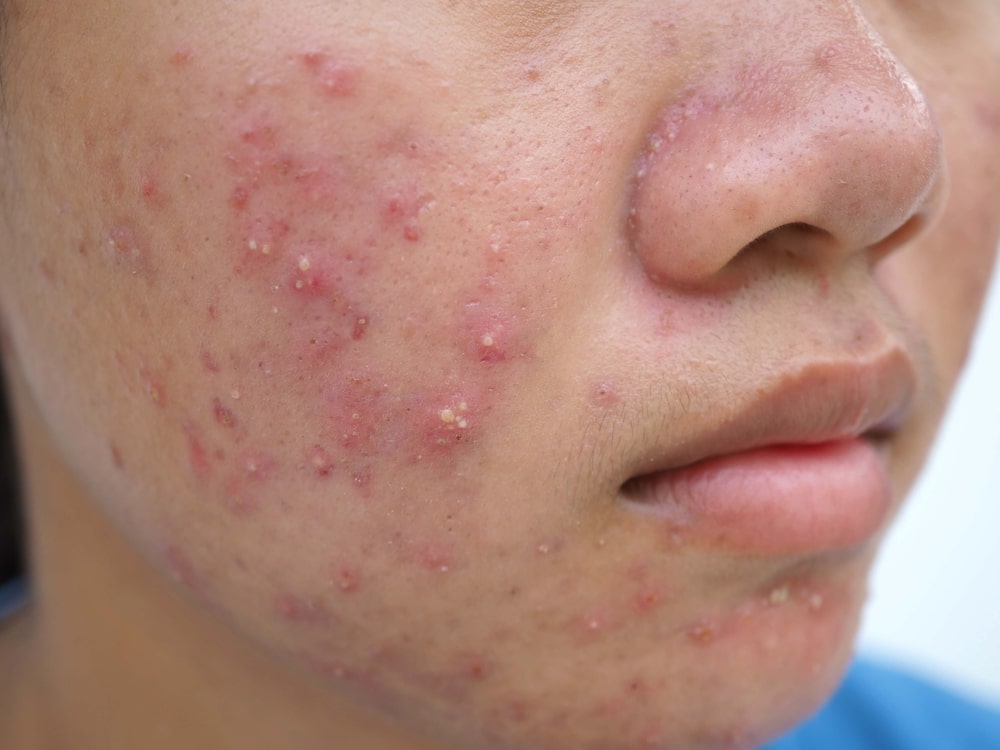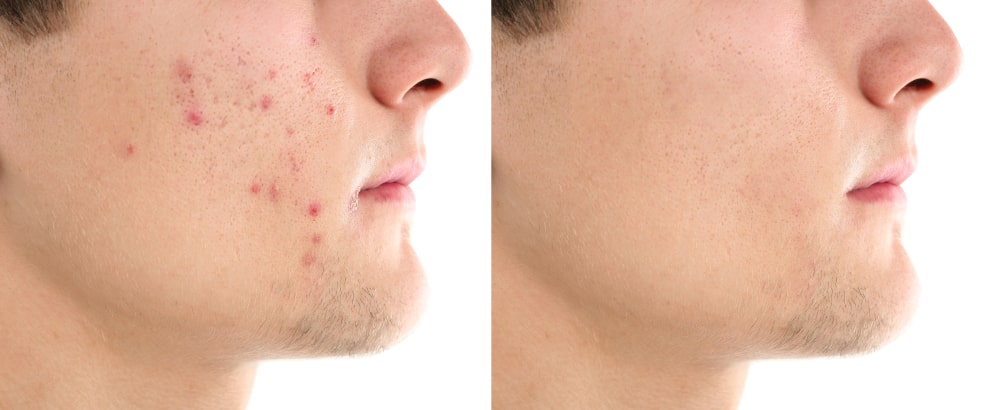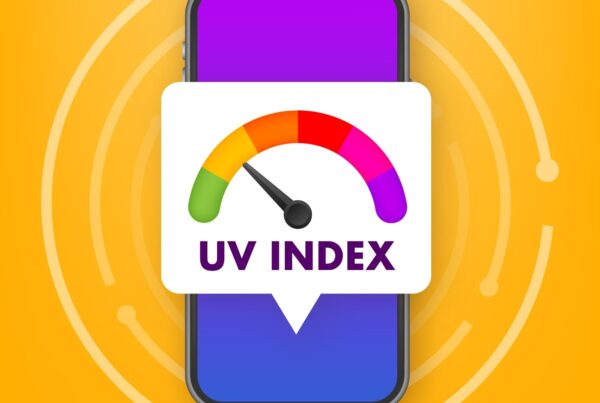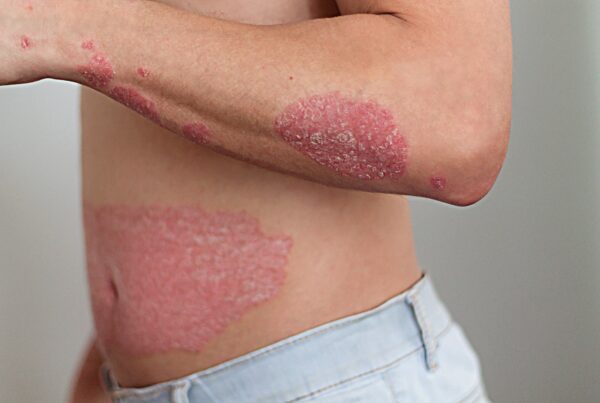
Acne can be painful, embarrassing, and frustrating. While many people associate acne with youth, acne is the most common skin condition in the US. It affects an estimated 50 million people each year and can persist well into a person’s 30s and 40s.
If you’re struggling with acne, you don’t have to face it alone.
Here at Dermatology Associates, we help people of all ages prevent and treat acne and learn to feel more comfortable in their skin. In this blog, we’ll discuss our top prevention and treatment options and help you understand why acne happens in the first place.
Let’s dive in.
What is Acne?
Acne is a skin condition. It occurs when dead skin cells and oil block hair follicles. These blockages cause whiteheads, pimples, blackheads, and other blemishes, some of which can be painful and persistent.
Here are some of the most common symptoms of acne:
- Whiteheads
- Blackheads
- Papules, which are small red, tender bumps
- Pimples or pustules, which are papules with pus at their tips
- Nodules, which are large, solid, painful lumps beneath the surface of the skin
- Cysts, which are painful, pus-filled lumps under the skin
Acne can cause emotional distress, skin scarring, and pain – depending on its severity. It can also occur anywhere on the body, although it’s most common on the face, forehead, upper back, chest, and shoulders.
While people of all ages can get acne, it’s most common in teenagers or people undergoing hormonal changes associated with pregnancy, menopause, or andropause. People with a family history of acne are also likely to develop acne.
What Causes Acne?
Acne usually occurs in areas of the body that produce oil or sebum. Regions like the face, forehead, chest, upper back, and shoulders have the most oil glands and the most hair follicles connected to these glands.
When oil glands become blocked, the hair follicle wall may bulge out, producing a whitehead. Alternatively, the plug may darken and stay open to the surface, causing a blackhead. While blackheads look like dirt trapped beneath the skin, they’re actually pores clogged with oil and bacteria, which turn brown when exposed to the air.
Pimples, meanwhile, look like raised red spots with a white, pus-filled center. They develop when a blocked hair follicle becomes infected or inflamed, and the blockage starts to produce a cyst-like lump beneath the surface of your skin.
Here are a few of the things that can cause or worsen acne:
- Hormonal changes. During puberty and middle age, people undergo hormonal changes that cause the sebaceous glands to enlarge and produce more sebum. These hormonal changes can lead to new or worsening breakouts, even in people who previously had clear skin.
- Medications. Drugs that contain testosterone, corticosteroids, or lithium can cause acne to appear or get worse, even when you use the drugs as prescribed.
- Stress. Stress is one of the biggest causes of acne. It can cause changes in the skin and lifestyle and exacerbate existing breakouts.
- Diet. People who consume carbohydrate-rich diets may have worse acne than those who eat diets full of leafy greens, beneficial fats, and good proteins.
One thing acne isn’t caused by is hygiene. While that was a common misconception for many years, it’s just not true. In fact, scrubbing the skin too hard or using harsh soaps or cleansers to clean the skin can irritate the dermis and make acne worse.

How to Prevent Acne
Want to reduce your breakouts or lower the chance that you’ll experience acne? Follow these tips:
- Keep your skin clean
After sweating, coming into contact with oily or greasy substances, or getting dirty, wash your face with a gentle, non-abrasive cleanser. Apply the cleaner with damp fingertips, gently rubbing it into your skin in small circles. Wash with warm water and pat dry.
- Choose the right skincare products
Instead of reaching for harsh products to stop or prevent an acne breakout, look for gentle, alcohol-free products. We recommend avoiding products like toners, harsh exfoliants, and astringents, which can dry out the skin and make acne worse.
- Keep your hair clean
If you have oily hair, it can actually cause acne on your forehead, shoulders, and back. To prevent this, shampoo your hair every other day, avoid touching it, and use a hair tie or band to keep it tied back from your face.
- Avoid touching your skin
Touching your face during the day can increase the oil levels on your skin, causing your acne to flare up. If you already have pimples, blackheads, or bumps, avoid the urge to pick, pop, or squeeze them, as doing so can cause scarring and infection and will make the acne take longer to clear.
- Stay out of the sun
Last but not least, practice safe sun by avoiding being outside in the heat of the day, wearing a wide-brimmed hat to protect your face, neck, and ears, and applying a high-quality, skin-safe SPF. Sun exposure can damage your skin and worsen acne.
Additionally, some acne medications make your skin very sensitive to the damaging ultraviolet rays present in the natural sun and tanning beds.
How a Dermatologist Treats Acne

If you’d like professional help treating your acne, you’re in luck. Dermatologists like Dermatology Associates can help you treat even severe acne breakouts and reclaim your clear, comfortable skin.
Here are a few of the top tactics dermatologists use:
Medications
A skilled dermatologist can issue prescription-strength medications that treat acne from the inside out. These medications work by reducing oil production in the skin, decreasing inflammation, and treating bacterial infections that may be the underlying cause of acne.
Ongoing Facials
Facials can be a great way to keep the skin clean, healthy, and moisturized and reduce or minimize the number of breakouts a person experiences each year. Since facials also promote healthy skin, they make the dermis less susceptible to environmental triggers.
Anti-Aging Treatments
Anti-aging treatments like laser therapy, chemical peels, and steroidal treatments can help reduce current breakouts and diminish the after-effects of acne, like scarring and redness. These treatments also help promote healthy skin, which can reduce the likelihood of future acne breakouts.
You Don’t Have to Live With Acne Forever – we can Help!
Acne and other skin conditions can be frustrating, embarrassing, and painful. Fortunately, there are effective treatment options available that can reduce the number and severity of outbreaks.
Here at Dermatology Associates, our team of experienced dermatologists provides specialized skincare services to clients in and around Whitefish, Libby, and Polson, with our main offices in Kalispell.
Contact us today to learn more about our team and how we can help you get your best skin yet.




